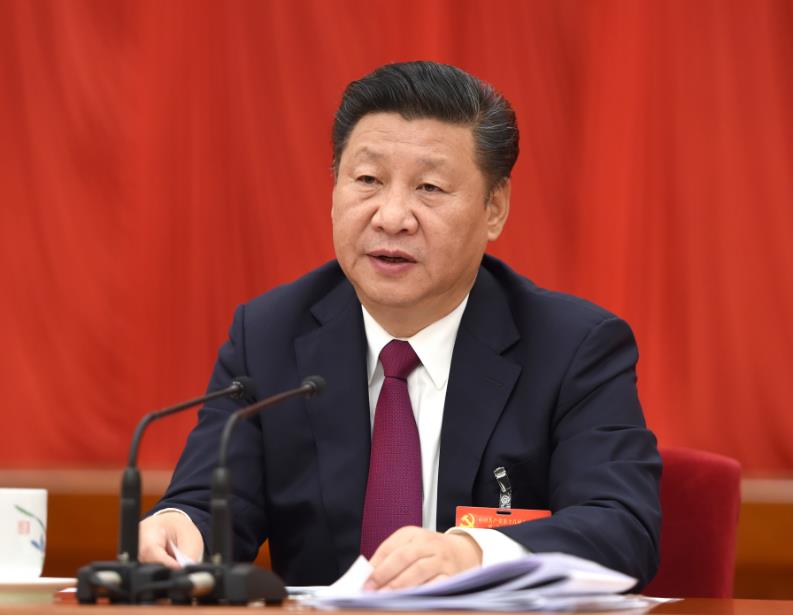Media Report

- Reuters reports: "China's Communist Party gave President Xi Jinping the title of 'core' leader on Thursday, putting him on par with past strongmen like Mao Zedong and Deng Xiaoping, but it signaled his power would not be absolute....The 'core' leader title marks a significant strengthening of Xi's position ahead of a key party congress next year, at which a new Standing Committee, the pinnacle of power in China, will be constituted. Since assuming office almost four years ago, Xi has rapidly consolidated power, including heading a group leading economic reform and appointing himself commander-in-chief of the military, though as head of the Central Military Commission he already controls the armed forces. While head of the party, the military and the state, Xi had not previously been given the title 'core'. Deng coined the phrase 'core' leader. He said Mao, himself and Jiang Zemin were core leaders, meaning they had almost absolute authority and should not be questioned."
- The New York Times: The Opinion Pages comments: "Throughout the 1990s and early 2000s, American business executives and political leaders of both parties repeatedly put forward what I label the 'China fantasy': the view that trade, foreign investment and increasing prosperity would lead to political liberalization in the world's most populous country....To say the least, things in China haven't turned out that way. Over the past few years, the Chinese regime has become ever less tolerant of political dissent — to such an extent that, these days, American leaders have become far more reluctant to make claims about China's political future or the impact on it of trade and investment. The 'China fantasy' got the dynamics precisely wrong: Economic development, trade and investment have yielded greater political repression and a more closed political system. This amounts to a new China paradigm: an intensely internationalized yet also intensely repressive one-party state....Why is it that trade and investment have led to a Chinese regime that represses dissent more than it did five, 10 or 20 years ago? The answer, put simply, is that the regime thinks it needs to do so, can do so and has fewer outside constraints inhibiting it from doing so."
- The Washington Post: Wonkblog comments: "Shortly after his private plane landed in Ohio on a recent morning, the Chinese billionaire set off down Interstate 75 to inspect the factory on which he has staked his legacy and the future of this gritty patch of the American Rust Belt....Now Cho Tak Wong is in charge of the factory. The billionaire chairman of Fuyao Group, the biggest maker of automotive glass in China, Cho rose from rural poverty by riding the same wave of globalization that devastated Moraine....But the next chapter of globalization is already unfolding inside Fuyao's factory, as the balance of power in the world economy tilts once more. Now it is China that experts fear is losing steam, forcing the country's wealthy investors and corporations to seek out profits overseas. They are snapping up U.S. businesses at a record rate and employing tens of thousands of U.S. workers. The shift is realigning Chinese and U.S. interests....'We're committed to working to benefit both the Chinese and American trade relations,' [Cho] said in an interview, speaking through a translator. 'All these problems will go away.'"
Calendar
- 2016-10-26 Xi’s Agents of Fear Keep Party on Edge in Anti-Graft Fight
- 2016-10-25 Duterte Looks to Reassure Skeptical Japan Over China Ties
- 2016-10-24 China’s Digital Soft Power Play
- 2016-10-23 China's Xi Jinping Seeks Safety in Numbers—Or Else
- 2016-10-21 China’s plan to organize its society relies on ‘big data’ to rate everyone
- 2016-10-20 Rodrigo Duterte and Xi Jinping Agree to Reopen South China Sea Talks
- 2016-10-19 As China’s Economy Slows, a Look at What Could Happen
- 2016-10-18 Kenya: China petitioned to stop building railway in park
- 2016-10-17 China courts Philippines leader Duterte amid signs of US rift
- 2016-10-16 Philippine Leader Rodrigo Duterte Rolls Dice With Embrace of China
News
- Reuters China's Xi anointed 'core' leader, on par with Mao, Deng
- The Washington Post China's male-dominated, anti-graft politics by the numbers
- The New York Times Search for Chinese Sailor Attempting Record Is Suspended
- Reuters China says Japanese military endangering Chinese aircraft
- Bloomberg Markets China's Millennials Are Risk Takers - and They're Dreaming Big
- The Wall Street Journal China's Tech Sector Is Underestimated, Venture Investors Say
- Bloomberg Business China Steps Up Yuan Rhetoric as Currency Falls to Six-Year Low
- BBC News China 'fake sanitary pads' scam sparks health concerns
- The Washington Post Philippine leader Duterte now wants U.S. troops out 'in the next two years'
- The New York Times China's Communist Party Declares Xi Jinping 'Core' Leader
- The Wall Street Journal Mainland China's Flow of Money to Hong Kong Stocks Dries Up
- The Financial Times China's ZTO raises $1.4bn in biggest US listing this year
- BBC News A tale of two factories: Is China taking US jobs?
Commentary
- The New York Times: The Opinion Pages America's Dangerous 'China Fantasy'
- The Washington Post: Wonkblog A Chinese billionaire is staking his legacy — and thousands of American jobs — on this factory in Ohio
- The Wall Street Journal: Law Blog China Orders Lawyers to Support Communist Party
- Bloomberg View China Gets Desperate About Debt
- The New York Times: Sinosphere How China's Politics of Control Shape the Debate on Deserts
- The Wall Street Journal: China Real Time In China, Officials Battle Pollution (Data) with Cotton Gauze
- The Diplomat Will Duterte End the US-Philippines Military Alliance?
